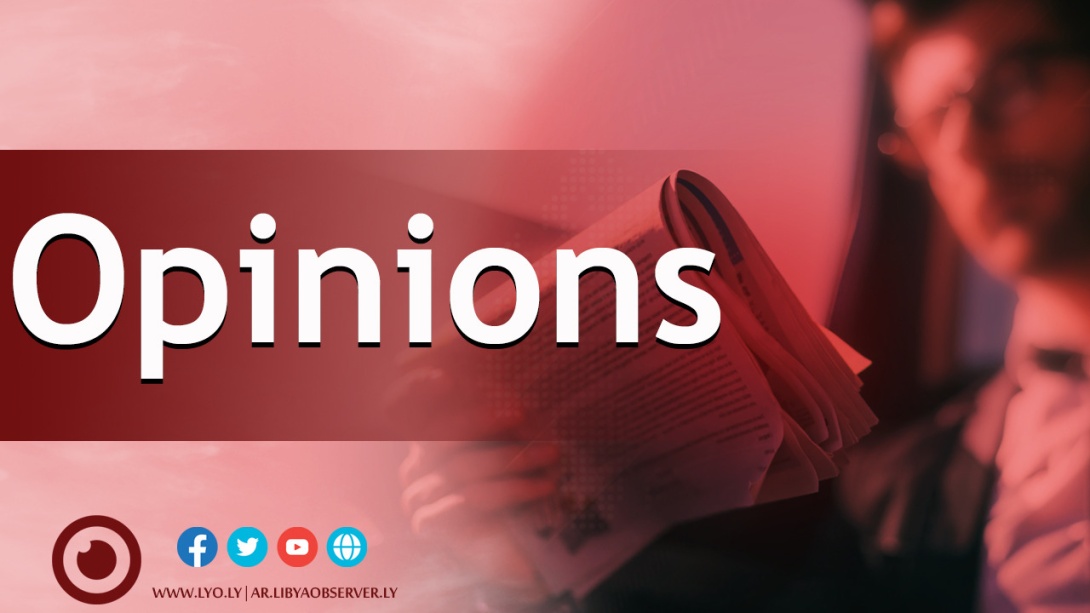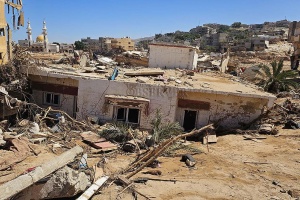By Youssef Lutfi, political writer
Insight into Niger developments and Libyan position

Introduction
The coup d'état in Niamey, led by the Commander of the Presidential Guard, Omar Abdourahamane Tchiani, which ousted the elected president, Mohamed Bazoum late last month, raised the fear and apprehension of many international and regional parties, against the backdrop of developments in the region during the past years, following Russian expansion at the expense of Western interests, due to Niger’s geopolitical and security importance to its Western allies, led by the United States and France.
Events in Niger followed a series of coups and security unrest that afflicted countries of the Sahel and Sahara and a number of West African countries, as the region witnessed in three years (2020-2023), 5 military coups in Sudan, Chad, Mali, Burkina Faso, and Guinea-Bissau.
Coups and military conflicts that followed led to a sharp deterioration in the security situation in the region, which in turn was reflected in the approach of international parties and their ability to exert their influence. The wave of coups in West African states led to the decline of French influence in its historic places of influence in favour of new international actors, and foremost Washington with its newly established huge air base in Niger in 2016, and Moscow, which has become the most active player on the African scene through the role played by the Wagner Group.
Limited options
Niger has exceptional strategic importance, as its distinguished geographical location and its common borders with 7 countries, make it a central node linking North, Central, and West Africa, which makes it a pivotal security partner for the international parties involved in the African scene, led by Paris and Washington, where the former has 4 military bases, the most important of which is (Base 101), which hosts 1,500 French soldiers, while the United States has a large central base in Agadez (Base 201) in addition to another military facility, as Niger is considered the center of NATO forces in the Sahel region and a key starting point for the military and security operations that Paris is conducting. Washington is in the region to fight armed jihadist groups.
In dealing with the coup and its leadership, Washington adopted a position less drastic and more balanced than Paris, as the US administration refuses to describe what happened in Niger as coup in its official statements and called for negotiation and resolving the dispute through diplomacy. Washington also announced the appointment of Kathleen Fitzgibbon to be the next US ambassador to Niger, a step Paris considered legitimization of the coup.
On the other hand, Macron presided over a defense council immediately after the coup took place and announced a three-day deadline (expired) for the military council, and Paris is pushing for regional military intervention by "ECOWAS" member states and implementation of severe penalties by international and regional parties.
Despite Paris's extreme enthusiasm for sanctions and military intervention, its options seem very limited. The principle of military intervention is rejected by international parties (the United States and Italy) that have vested strategic interests in Niger, and other regional ones, the most important of which is Algeria, which fears the contagion of unrest sweeping the region, especially after the outbreak of clashes between the liberation of Azawad movement and the Malian army in the "Bir" region in northern Mali near the Algerian border last August 12, after a stalemate that lasted for years, following the Algerian sponsored-peace agreement.
A number of ECOWAS countries entrusted with military intervention also suffer from security unrest and internal crises, led by Senegal and Sierra Leone, while the Parliament of Nigeria - which suffers from internal unrest and an economic and living crisis - voted against military intervention in Niger. The African Union also announced its categorical rejection of any Military intervention in Niger, and the governments of Ouagadougou and Bamako warned against any military intervention, considering that this would be a declaration of war on them, and Guinea Conakry declared its non-compliance with the sanctions imposed by the ECOWAS on Niger.
These premises, in addition to tactical and logistical considerations related to the ability to gather the required forces, overcome border obstacles, and the security threat of jihadist groups, indicate that chances of military intervention appear to be very weak.
Possible fallout
Niger neighbours three pivotal countries in the domain of energy security and immigration, which makes it an important security node in the region. The southern neighbour, "Nigeria", is the largest oil producer in the continent and the second largest exporter of gas after Algeria, and it possesses a huge human reservoir estimated at approximately 206 million, which makes it perhaps the biggest threat to the stability of international energy markets and migration flows. As for the neighbours of the north, the first of them is Algeria, which is the third largest gas exporter to Europe and the largest gas producer in Africa, then Libya, which has the largest oil reserves in the continent and the second largest oil exporter - in natural conditions - it has exceptional importance to European gas energy markets, especially in light of the distress Europe faces against the backdrop of the repercussions of the Russian-Ukrainian war. These Mediterranean countries also represent the main crossing point for most major energy transfer projects and waves of African migration.
The repercussions of Niger's turmoil not only put Europe in the face of the threat of energy supply interruption, migration flows, and the failure of its African investments, but also put it in the face of Moscow's expanding influence, which poses a major strategic threat to European capitals.
The spread of Wagner forces extends to Mali, Burkina Faso, the Central African Republic, and Sudan. The group also uses Libya as a starting point for its operations in Africa, and it provides security services to African regimes and governments in exchange for the right to extract resources, which makes the Niger coup a golden opportunity given the stockpile the country boasts of uranium (5% of the world's reserves and 7% of its production).
On the other hand, the United States does not seem concerned about the role of Russia or Wagner in events in Niger, as announced by the spokesperson for the US National Security Council, Adam Hodge.
This indicates a discrepancy between the European and American vision/approach to the crisis and the African situation, as stated by Pentagon spokeswoman Sabrina Sani that they "are not worried, and continue their military operations." In contrast to Europe, which is preoccupied with energy supplies and immigration boats, Washington's approach is concerned with confronting the expansion of jihadist groups in West Africa and implementing its security agenda in the first place.
Washington's calm in the face of the wave of African coups may be explained by investigative reports that reveal Washington's strong relations with a number of security and military agencies in African countries that have launched coups in the past years, as a report by The Intercept newspaper states that a number of African officers trained by the United States have been involved in at least 10 coups, in West African countries since 2008. In Niger, the United States has a strong relationship with one of the leaders of the coup, who previously headed the Special Forces Unit, and now assumes the position of Chief of Staff, General Musa Parmo.
Libya between border and diplomatic turmoil
Libya suffers from southern border turbulence, which contributed to the exacerbation of its internal security crisis. The unrest in Chad and Sudan and the consequent activity of the rebel movements, the high rates of smuggling activities and irregular migration directly contributed to fueling the existing conflict, the deterioration of living conditions in the country and the rise in crime rates, as the south of Libya has become a launching pad for the operations of the Chadian rebel movements and the Sudanese armed groups in return for the support of Haftar’s Dignity (Karama) Forces and the local militias militarily and logistically. A number of cities and regions of the south have also turned into outposts for a number of these militias that are smuggling immigrants, fuel, and weapons as a main source of income.
The Niger crisis carries with it a greater threat - in the event of an exacerbation of the humanitarian situation - and living conditions by turning irregular migration operations into large waves of displacement towards the Libyan south, which places the country in front of a serious demographic and security challenge that may have a significant impact on the political and economic conditions in the country and the region as a whole.
On the political level, the absence of an accurate political and security reading of the situation in Niger and of the major geopolitical changes on the part of the Government of the National Unity and the agencies concerned with the security issue, led by the General Intelligence Service, portends a diplomatic upheaval that may result in severe political and security damage. The security and diplomatic failure may also open the way for Khalifa Haftar to exploit this fumbling by opening channels of communication and cooperation with the new authority in Niger.
In addition to the security and political challenges imposed by the wave of military coups on the southern borders, the living crisis that may afflict the regions of southern Libya in the event of an exacerbation of the humanitarian crisis in Niger and its surroundings will force Tripoli to address urgent humanitarian and security files, which may lead to government paralysis and an economic crisis in the event of Lack of clear policies and advance planning.
The accelerating changes taking place in the Sahel and Sahara region require a serious study of the imminent and expected risks and the changing geopolitical reality, in order to design public policies and diplomatic tracks aimed at approaching these issues realistically according to the available tools and to serve as a guide for the political and security authorities to be able to adopt constructive positions that serve the national interest, instead of Improvised measures and ill-conceived positions that will cost the country dearly.
Disclaimer: The views and opinions expressed in this article are those of the writer, and do not necessarily reflect those of the Libya Observer



